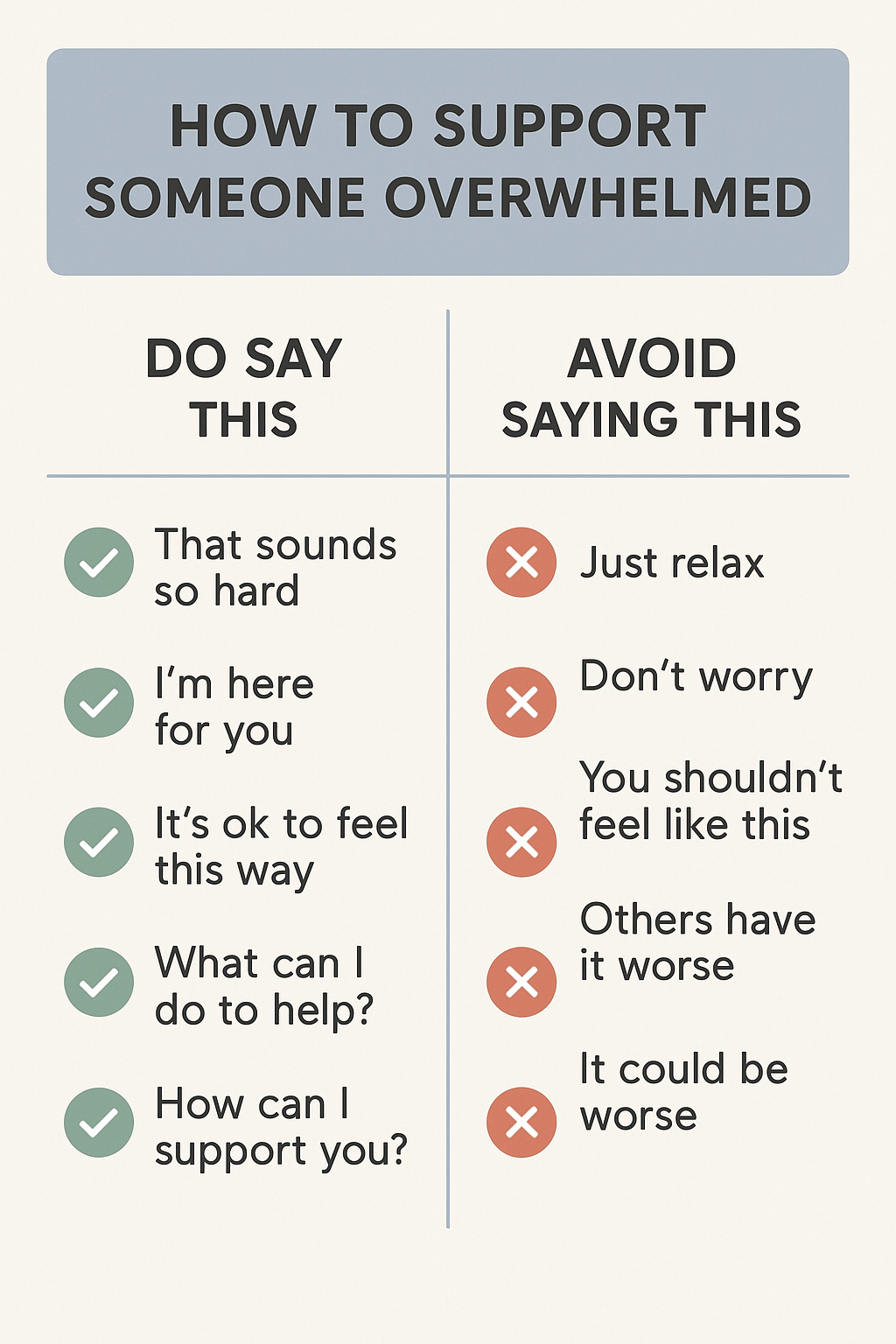What to Say to Someone Overwhelmed: The Complete Guide
Understanding Overwhelm: Why Words Matter
At its core, feeling “overwhelmed” is a state of being completely submerged by your thoughts and emotions. Psychologically, it’s an intense response to stress where you feel your internal or external resources are inadequate to cope with the demands placed upon you. It’s not just about being busy; it’s the paralyzing feeling that everything is too much. Knowing what to say to someone overwhelmed in this state is crucial. Common triggers for this feeling are universal and can include intense pressure at work, financial instability, relationship conflicts, or health concerns.

This is why your language is so important. Generic advice like “just cheer up” or “look on the bright side” often falls flat because it fails to acknowledge the person’s reality. Supportive language, on the other hand, validates their experience. It shows them that they are seen, heard, and not alone in their struggle. It shifts the dynamic from trying to “fix” their problem to simply being present with them in it, which is often far more powerful and effective.
General Principles of Comforting Language
Before you even think about what to say, consider how you’ll say it. The effectiveness of your words hinges on a few core principles: tone, timing, and empathy. A calm, gentle tone is far more effective than an energetic, overly positive one. Timing is equally important; wait for a quiet moment where the person is receptive to talking, rather than interjecting during a high-stress event.
The cornerstone of effective support is validation. Using simple phrases that validate their feelings can immediately lower their defenses. Statements like, “I hear you,” “That sounds incredibly difficult,” or “It’s okay and perfectly understandable to feel this way,” communicate acceptance, not judgment.

This approach is the direct antidote to toxic positivity, which involves dismissing negative emotions with forced optimism. Avoid phrases like “don’t worry,” “it could be worse,” or “just relax.” These statements invalidate the person’s feelings and can make them feel even more isolated. Instead, focus on offering genuine comforting words for stress that honor their emotional state. The goal is to provide comfort, not to force a solution or a mood change.
Exact Phrases: What to Say to Calm Someone Down
When someone is in the throes of feeling overwhelmed, having specific phrases ready can make all the difference. Here are some examples of what to say to calm someone down, broken down by their intended purpose.
Grounding Statements
These phrases help bring a person back to the present moment and create a sense of safety.
“Take a deep breath. You don’t have to talk, just breathe with me for a minute.”
“I’m right here with you. You are safe.”
“Let’s just focus on this very moment. Nothing else matters right now.”
Reassurance Phrases
These phrases help alleviate the pressure the person feels to have everything figured out immediately.
“You don’t have to solve everything today. Just getting through this moment is enough.”
“It’s okay to not be okay. Let the feelings come, and I’ll stay with you.”
“This feeling is temporary. It will pass.”
Words of Encouragement for Overwhelmed Person
This is about expressing faith in their resilience without dismissing their current struggle.
“I know this is incredibly hard, but I believe in your ability to get through this.”
“You’ve handled so much before, and you have the strength to handle this too.”
“I am so proud of you for just being here and facing this.”
Situational Guidance: Tailoring Your Words
The right supportive things to say often depend on the context. The way you support a coworker is different from how you support a partner or a friend in a crisis. Here are some tailored phrases to reduce stress for different scenarios.
At Work
Workplace overwhelm is often tied to deadlines, burnout, and heavy workloads.
- Scenario: A coworker is visibly stressed and staring blankly at their screen, clearly hitting a wall on a project.
- What to say:
“Hey, it looks like things are intense right now. Is there a small piece of this I could take off your plate to help you get some breathing room?”
“Don’t worry about that other task for now, I can cover it. Just focus on one thing at a time.”

In Relationships
For a partner, friend, or child, emotional connection is key.
- Scenario: Your partner comes home from a long day, drops their bag, and sighs, saying, “I just can’t handle everything right now.”
- What to say:
“I’m sorry you’re feeling this way. You don’t have to ‘handle’ anything tonight. Let’s just sit down. Do you want to talk about it, or would you rather have a quiet distraction?”
“What does support look like for you right now? A hug? A hot drink? Just tell me what you need.”
In Crisis
During moments of intense crisis like a panic attack, grief, or medical stress, simplicity and presence are vital.
- Scenario: A friend calls you, breathing heavily, and is clearly in the middle of a panic attack.
- What to say:
“I’m here. I’m not going anywhere. Can you hear my voice? Just focus on my voice.”
“Can you name three things you see around you right now? Let’s ground ourselves together.”
Words to Avoid: Common Mistakes
Just as important as knowing what to say is knowing what not to say. Even with the best intentions, certain phrases can do more harm than good. A major mistake is dismissing their feelings with phrases like, “It’s not a big deal” or “You’re overreacting.” This invalidates their emotional experience and shuts down communication.
Another common pitfall is offering overly logical, unsolicited advice when the person is in a highly emotional state. When someone says, “I have so much to do, I can’t even think straight,” responding with “Just make a to-do list and start with the easiest task” can feel dismissive. They need emotional co-regulation first, not a project plan.
Finally, avoid rushing them through their feelings. Statements like, “You’ll be fine, just move on” or “Try to be positive” pressure them to suppress what they’re feeling, which can prolong the sense of overwhelm. True support allows them the space and time to process their emotions at their own pace.
Beyond Words: Non-Verbal Support
Sometimes, the most powerful support isn’t verbal at all. Your physical presence can be incredibly comforting. Simply sitting with someone in silence, offering a reassuring hug (if appropriate), or making them a cup of tea communicates care without demanding they articulate their feelings.
You can also offer support from a distance by sending calming media, like a playlist of gentle music or a link to a guided meditation app. Thoughtful gifts can also be a tangible form of care. Products designed for relaxation, such as stress relief tea, a high-quality journal for processing thoughts, or a weighted blanket for a sense of security, can be wonderful gestures. Remember to pair your words with actions for a deeper impact.
Helpful Tools & Resources
When someone is ready to take proactive steps, you can gently suggest some helpful tools and resources.
- Meditation Apps: Calm and Headspace offer guided meditations specifically for stress and anxiety.
- Journaling Apps: Tools like Daylio or Stoic can help individuals track their moods and untangle their thoughts in a private space.
- Relaxing Media: Curated YouTube playlists with calming music, nature sounds, or guided breathing exercises can be a great, free resource.
- Relaxation Products: For tangible comfort, consider items like:
- Herbal stress relief teas with ingredients like chamomile or lavender
- White noise machines to help create a calming sleep environment
- Aromatherapy diffusers with essential oils like eucalyptus or frankincense
FAQs
What can I text someone who is overwhelmed?
Keep it short, simple, and pressure-free. Try: “Thinking of you. No need to reply, just wanted to send some support your way.” Or, “I’m here if you need to vent. No judgment, just listening.” A list of quick phrases can be a lifesaver.
How do I calm someone having a panic attack?
Speak in a low, calm voice. Reassure them that they are safe and that the feeling will pass. Encourage slow, deep breaths. Ask them simple, grounding questions, like “Can you feel your feet on the floor?” or “Name one blue thing you can see.”
What if I say the wrong thing?
It happens. The most important thing is your intention. If you realize you’ve said something unhelpful, simply apologize. Say, “I’m sorry, that wasn’t the right thing to say. What I meant is that I care about you and I’m here for you.” Authenticity is better than perfection.
Can quotes help?
They can, but timing is everything. Sending a quote when someone is in the peak of crisis might not be helpful. However, once they are feeling a bit more stable, comforting quotes can serve as a gentle reminder of their strength. A quote like, “This too shall pass,” can offer a glimmer of hope.
Conclusion & Call-to-Action
Ultimately, supporting someone who feels overwhelmed isn’t about having a magical solution. It’s about showing up with empathy. Your words, when chosen with care, have a profound healing impact, reminding the person that they are not alone in their struggle. The connection you offer is the most powerful tool you have.
We encourage you to bookmark this article so you can refer back to it whenever you need to find the right words.
For further reading on wellness and relaxation, check out our other guides:






